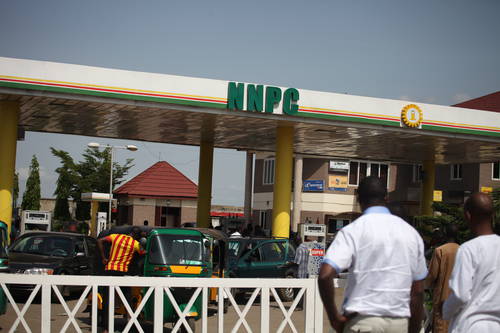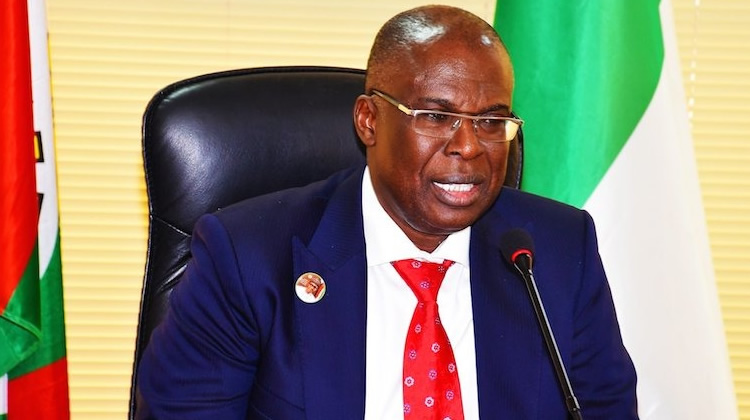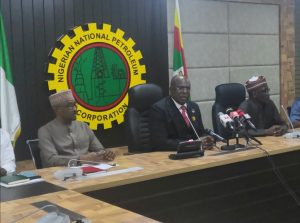The Minister of State for Petroleum Resources, Chief Timipre Sylva, has revealed that the current price of Premium Motor Spirit, popularly called petrol, by the Nigerian National Petroleum Company Limited, is based on the mandate from the Federal Government as regards PMS subsidy.
Sylva’s remarks came as oil marketers stated that the supply hitches in the downstream oil sector often lead to fuel scarcity, which might persist till June, based on the government’s plan to end petrol subsidy in that month.
The petroleum minister spoke in Abuja on Monday, at the resumption of the scorecard series (2015-2023) of President Muhammadu Buhari.
Last week, the Minister of Finance, Budget and National Planning, Zainab Ahmed, said the Federal Government had budgeted about N3.6tn for fuel subsidy till June 2023.
Sylva, while speaking in Abuja on Monday, insisted that subsidy had been a burden, but stressed that it was a mandate on NNPC which had made the oil firm to continue selling PMS at a loss.
He said, “The management of the supply situation under this subsidy regime is not easy. We must all agree that so much money is being burnt in our cars, but somehow we have to put funds to continue to keep the country wet.
“Sometimes if you really think deeply you begin to wonder what magic we are doing to be able to keep this country wet consistently. Considering that you buy something, let’s say for N10, and you are to sell it at a loss.
“And then you are expected to go back to buy the same thing, and come back again to sell it at a loss. So at every point in time, you are looking for more money to continue to buy it, because you’re mandated to sell it at a loss.”
Sylva added, “So if you are a businessman, look at it from this perspective, that you are now in the business where you are mandated to sell at a loss to the public. That is not an easy job, I must tell you.”
Responding to a question on how he would feel when buying petrol at N300/litre, Sylva said he would not feel bad about it.
“If you ask me how I will feel as a private citizen to buy petrol at N300/litre, sadly, I will say I won’t feel bad, knowing the actual situation. And if you compare Nigeria to other countries, you will understand,” he stated.
The minister added, “When you convert the N300/litre that you are talking about to other currencies, then you will understand. A lot of you travel to the United Kingdom or the United States, how much do you buy petroleum products there? Even in Arab communities that produce crude oil.”
He said the cost of the commodity in Nigeria was not as high as what was obtained in other countries, but stressed that the current national consensus was that subsidy on petrol was no longer sustainable.
“Unfortunately we are still in a subsidised regime, which all of us know. As a country, I think it is a national consensus now that subsidy is not sustainable, but together we will get there,” Sylva stated.
He said until the cost of petroleum products were market-driven, investors would continue to shy away from investing in the downstream oil sector.
“Under a subsidised regime, who is going to invest? If you build a refinery, how is your refinery going to make a profit under a subsidised regime? But if you have a market-driven situation, you’ll see that a lot of investors will come.
“And the more refineries we have, this problem of access to petroleum products will be a thing of the past,” Sylva stated.
 The Federal Government on Monday revealed that it had acquired shares in four refineries operating in various locations across the country.
The Federal Government on Monday revealed that it had acquired shares in four refineries operating in various locations across the country.
It outlined the refineries to include the 650,000 barrels per day integrated Dangote Refinery in Lagos; 12,000bpd Azikel Modular Refinery in Bayelsa; 5,000bpd Waltersmith Modular Refinery in Imo; and 2,500bpd Duport Modular Refinery in Edo.
The government also announced that the 60,000bpd component of the Port Harcourt Refining Company in Rivers State, would begin operations in the first quarter of this year, stressing that the facility had been completed.
The Minister of State for Petroleum Resources, Chief Timipre Sylva, and the Group Chief Executive Officer of the Nigerian National Petroleum Company Limited, Mele Kyari, disclosed this in Abuja at the ministerial scorecard series of the current administration.
Commenting on the equity of the Federal Government in Dangote Refinery, Sylva said it was 20 per cent, adding that the government had also bought shares in three other refineries.
He said, “We have 20 per cent equity in Dangote Refinery and we have also taken 20 per cent equity in Azikel Refinery. We took 30 per cent in Waltersmith, and we also have 30 per cent in Duport Refinery.
“Duport Refinery is already finished. They’ve concluded the construction. It only remains to start operations. I’m sure that within the next month or so, Duport Refinery will also start operations.”
The minister explained that the Dangote Refinery already had an established contract with NNPC, in terms of crude oil supply, but noted that some modular refineries usually accessed crude oil from assets closer to the plants.
“So they (modular refineries) have this (crude oil supply) contract with private sector owners of these assets that are near them,” he stated.


